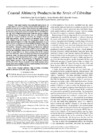Identificador persistente para citar o vincular este elemento:
https://accedacris.ulpgc.es/jspui/handle/10553/47265
| Título: | Coastal Altimetry Products in the Strait of Gibraltar | Autores/as: | Gómez-Enri, Jesús Cipollini, Paolo Passaro, Marcello Vignudelli, Stefano Tejedor, Begoña Coca, Josep |
Clasificación UNESCO: | 250616 Teledetección (Geología) 2510 Oceanografía |
Palabras clave: | Coastal altimetry Data screening Retracking Strait of Gibraltar (SoG) Tide gauge, et al. |
Fecha de publicación: | 2016 | Publicación seriada: | IEEE Transactions on Geoscience and Remote Sensing | Resumen: | This paper analyzes the availability and accuracy of coastal altimetry sea level products in the Strait of Gibraltar. All possible repeats of two sections of the Envisat and AltiKa groundtracks were used in the eastern and western portions of the strait. For Envisat, along-track sea level anomalies (SLAs) at 18-Hz posting rate were computed using ranges from two sources, namely, the official Sensor Geophysical Data Records (SGDRs) and the outputs of a coastal waveform retracker, the Adaptive Leading Edge Subwaveform (ALES) retracker; in addition, SLAs at 1 Hz were obtained from the Centre for Topographic studies of the Ocean and Hydrosphere (CTOH). For AltiKa, along-track SLA at 40 Hz was also computed both from SGDR and ALES ranges. The sea state bias correction was recomputed for the ALES-retracked Envisat SLA. The quality of these altimeter products was validated using two tide gauges located on the southern coast of Spain. For Envisat, the availability of data close to the coast depends crucially on the strategy followed for data screening. Most of the rejected data were due to the radar instrument operating in a low-precision nonocean mode. We observed an improvement of about 20% in the accuracy of the Envisat SLAs from ALES compared to the standard (SGDR) and the reprocessed CTOH data sets. AltiKa shows higher accuracy, with no significant differences between SGDR and ALES. The use of products from both missions allows longer times series, leading to a better understanding of the hydrodynamic processes in the study area. | URI: | https://accedacris.ulpgc.es/handle/10553/47265 | ISSN: | 0196-2892 | DOI: | 10.1109/TGRS.2016.2565472 | Fuente: | IEEE Transactions on Geoscience and Remote Sensing [ISSN 0196-2892], v. 54 (9), p. 5455-5466 (Septiembre 2016) |
| Colección: | Artículos |
Citas SCOPUSTM
29
actualizado el 08-jun-2025
Citas de WEB OF SCIENCETM
Citations
26
actualizado el 25-ene-2026
Visitas
89
actualizado el 01-nov-2024
Descargas
165
actualizado el 01-nov-2024
Google ScholarTM
Verifica
Altmetric
Comparte
Exporta metadatos
Los elementos en ULPGC accedaCRIS están protegidos por derechos de autor con todos los derechos reservados, a menos que se indique lo contrario.
